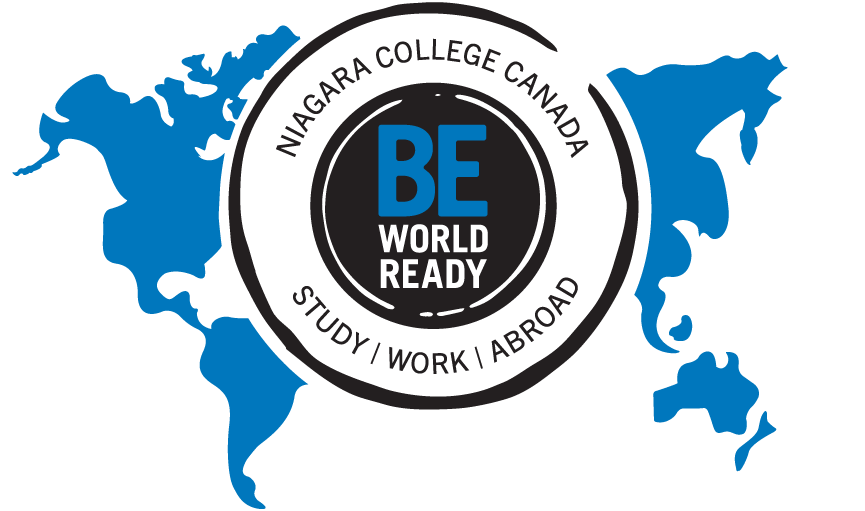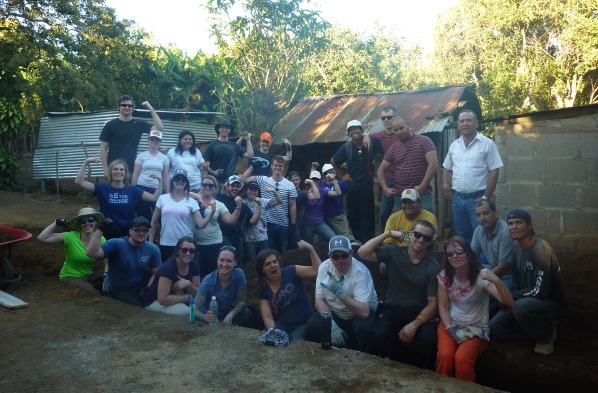
Twenty two individuals from Niagara College left for Nicaragua on Feb. 23 to participate in a Me to We volunteer trip, helping to build a community school in an impoverished community so far away from the familiar comforts of home. Seven days later, a single unit returned – bonded by a life-changing experience.
The determined pack of students, mostly from NC’s Police Foundations program, were led by program coordinator Jim Norgate. Norgate says the trip was unlike anything he’s ever encountered, not only during his 13 years of teaching at the College, but in all of his 44 years.
“What the students expected to do was go to Nicaragua and build a school,” he says. “While they built the school, they as individuals became rebuilt, renewed. It’s undeniable.”
Each day, the group set out from their jungle lodge on a 40-minute bus trip to their work site. Their mission was to work on the Grade 2 classroom for the school, which was being built one classroom at a time as part of Me to We’s Adopt a Village program. Under the guidance of local contractors, they dug the foundation with pickaxes and shovels, and laid the rebar by hand, bending the metal and connecting pieces with twist-ties. Countless buckets of sand and gravel were carried to wherever they were needed. Cement was hand mixed. It was physically demanding manual labour and Norgate’s voice rings with pride as he described how the students shone through it all, determined to keep going, often needing to be reminded to take breaks.
“We essentially built a house without power. I had high expectations of the students but I was astounded by their work ethic,” he says.
He wasn’t alone.
“At the end of our week, I asked the contractors and the Nicaraguan who oversees the group to tell me the truth about how we did. He said our group did the work of three to four groups,” says Norgate. “They were blown away. The foreman told us that we worked so hard that he never got to rest because he had to keep leaving to get more supplies.”
Every evening, the group returned to their accommodation in the jungle, where the canopy of wilderness made nights even darker. While drinking water was always available, some days, they lived without running water available to shower, flush toilets or even wash their face. Some days, there was no electricity. Once, a 6.4-maginitude earthquake rattled the group from their sleep at 3:40 a.m. Not once did Norgate hear a complaint from his group.
Dinner was always followed by module time, run by the Me to We facilitators. The modules aimed at teaching the students about the Nicaraguan culture, and to help them better identify with the local people, experiencing challenges first hand like shopping to feed a family of five at the local market with only $3. The depth of the discussions that followed the modules chipped away at superficiality. Soon, students began to open up to one another in new ways, and shared their personal stories — some, for the very first time, setting them on a new path of healing.
As the group bonded, Norgate also saw changed individuals who were increasingly focused on helping others – literally, shifting from a ‘me’ to ‘we’ focus. Whether someone needed a drink of water or a person to talk to, there was always a student stepping in to help. At meals, Norgate would see students bringing items like cutlery or lemonade to the table for the entire group, voluntarily – without prompting or request.
“It seems like these are simple things, but they’re not. In fact, it’s completely the opposite of what you normally see,” he says.
Norgate had always longed to participate in this type of volunteer experience, and instead of doing it on his own, wanted to give students the opportunity to do the same. He views the trip as not only part of his personal journey, and part of each participant’s personal journey, but the journey of the group as the cohesive unit they became.
All of this was in addition to the impact they would have on a local community in Nicaragua – and that was no small endeavour. Norgate points out that knowing they made a difference had a profound impact on the group. On their final day, when a small ceremony was held for them before their departure, students were noticeably moved; in some cases, to tears.
“The students felt as if they were leaving a part of themselves behind,” he said. Now that they are home, he knows that no one who participated will ever be the same.
“They won’t look at things the same way anymore, or think about things the same anymore, they won’t make the same judgments or have the same preconceived notions,” he says.
He believes that the experience is particularly valuable one for those entering the field of policing.
“It proved to the students that they truly feel good about helping people, which is the key to policing. It also gives them a greater understanding that everyone’s got their own story and they have to be careful about judgments or opinions,” he says. “This is a benefit for anyone, anywhere in life, but there’s absolutely no doubt that it helps in the practical application of policing.”
Before they left for Nicaragua, Norgate wanted to provide the students with the opportunity. Now that it’s over, Norgate views it differently. “I’m honoured they allowed me to do it,” he says.
Norgate isn’t only a teacher at Niagara College; he’s a graduate. While growing up in Niagara Falls, he knew that he wanted to become a police officer at a young age. His passion for the field led him to enroll in Niagara College’s Law and Security program. Just days after he graduated from the College in 1990, he began working for the police force in Peterborough.
Over the years, his involvement as a hockey coach led him to turn his interest to teaching. That’s when he spotted a job opening at Niagara College and has been a part of NC ever since.
“Teaching suits my personality. Not many people have the opportunity to do what they love and make a living out of it,” says Norgate. “I’m the luckiest person on the planet and I know it.”


